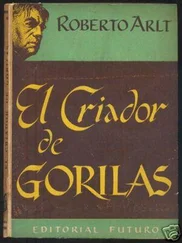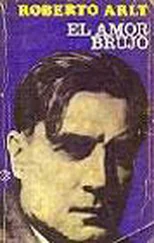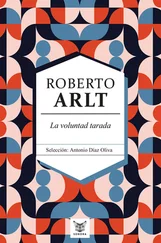The crowd parted as we came by, as they did not want us to stain them with the dirt we were carrying.
Ashamed, I thought about the ridiculous figure I must be presenting; to crown my unfortunate situation, the plates and cutlery were making a scandalous noise, as if announcing my ignominy. People stopped to watch us go past, enjoying the spectacle. I didn’t look at anyone, I felt so humiliated, and, like the cruel fat woman who walked ahead of us and slowed us down, I endured the jokes that our appearance provoked.
Various cabs escorted us, their drivers offering us their services, but Doña María, deaf to them all, walked in front of the table, whose legs caught the light that came from the shop windows. In the end, the drivers gave up their pursuit.
Every now and then Stinking God would lift his bearded face towards me over his green scarf. Thick drops of sweat ran down his dirty cheeks, and in his sad eyes there shone a doglike despair.
We rested in Lavalle Plaza. Doña María made us put the improvised barrow down on the ground and scrupulously examined its load, reorganised the bundle and settled the casseroles, whose lids she secured in place with the four corners of a dishcloth.
Bootblacks and newspaper boys had surrounded us. The prudent presence of a policeman helped us avoid possible complications, and we went on our way again. Doña María was going to the house of one of her sisters who lived at Callao and Viamonte.
Sometimes she would turn her pale face, look at me, with a slight smile twisting her colourless lips, and say:
‘Are you tired, Silvio?’ Her smile would ease my shame; it was almost a caress that cheered my heart after the spectacle of her cruelty. ‘Are you tired, Silvio?’
‘No, Señora.’ The woman, turning away from me with a smile that reminded me of Enrique Irzubeta’s smile when he escaped from the police, continued her angry way.
Now we were going down lonely streets, scarcely lit, with burgeoning plantains by the pavements, tall buildings with beautiful façades and windows covered with opulent curtains.
We went past an open balcony.
A young man and a young woman were talking in the shadows; the sound of a piano came from the orange-lit room.
My heart contracted with envy and sadness.
I thought.
I thought that I would never be like them… I would never live in a beautiful house and have an aristocratic girlfriend.
My heart contracted with envy and sadness.
‘We’re nearly there,’ said the woman.
A deep sigh swelled our chests.
When Don Gaetano saw us coming back into the cave, he shouted, raising his arms cheerfully to the sky:
‘Let’s go and eat in the hotel, guys!.. Hey, you’d like that, Don Miguel? We’ll go there later. Shut the door, shut the door, strunzo .’
A marvellously childish smile altered Stinking God’s face.
Sometimes at night I would think of the beauty with which poets made the world shake, and my heart would flood with pain, like a mouth filling with a scream.
I thought of the parties they went to, the parties in the city, the parties in the city parks lit with torches bright as the sun in the flowering gardens, and my poverty fell from my hands.
I do not have words, I cannot find words, to ask for mercy.
My soul is desolate and ugly as a bare knee.
I am looking for a poem I cannot find, the poem sung by a body that has suddenly been peopled by despair, been given a thousand vast mouths, two thousand shouting lips.
Distant voices reach my ears, resplendent pyrotechnics, but I am here alone, as if held down to my world of misery by nine stakes.
Third floor, apartment 4, Charcas 1600. That was the address where I had to deliver the package of books.
These luxurious apartment blocks are strange and unique.
From the outside, with their harmonious lines of friezes that emphasise the sumptuousness of the proud and complicated cornices, with their wide windows protected by bent glass, they make the poor devils who look at them believe in similar refinements of luxury and power; on the inside, the polar darkness of their deep and lonely halls cools the spirits of anyone who loves wide open skies covered with cloudy Valhallas.
I stopped in front of the porter, an athletic fellow in a blue uniform who was reading a newspaper with an air of self-sufficiency.
He looked me over from head to toe like the guardian of some dread portal; then, happy to have reached the hypothetical conclusion that I was no thief, he allowed me to come in, with the sort of indulgence that could only have arisen from his proud blue cap with its gold frogging over the visor. All he said was:
‘The lift, over to the left.’
When I came out of the iron cage I found myself in a dark corridor with a low ceiling.
A polished lamp spread its dying light over the polished tiles.
The door to the apartment was a single unglassed panel, and its little round bronze lock made it look like the door to some gigantic steel safe.
I rang the bell, and a maid in a black uniform with a white apron showed me into a room papered in blue, with livid golden lilies.
Through the glass that was covered in moiré gauze came a clear blue light like that of a hospital. A piano, girlish touches, bronzes, vases: I looked at everything. Suddenly a most delicate perfume announced her presence: a side door opened and I found myself confronted by a woman with a childish face, thin ringlets hanging down her cheeks, and a generous décolleté. A cherry-coloured velveteen robe did not cover her little white-and-gold slippers.
‘ Qu’y a t-il, Fanny? ’
‘ Quelques livres pour Monsieur… ’
‘Do we need to pay?’
‘They have been paid for.’
‘ Qui… ’
‘ C’est bien. Donne le pourboire au garçon. ’
The maid took a few coins from a tray to give to me, and I said:
‘I don’t take tips from anybody.’
The maid angrily withdrew her hand, and the courtesan understood my gesture. I believe she did, at any rate, because she said:
‘ Très bien, très bien, et tu ne reçois pas ceci? ’
And before I could avoid her, or rather, before I could ready myself to receive it fully, the laughing woman kissed me full on the lips, and I saw her disappear, laughing like a little girl, through the hidden door.
Stinking God has woken up and is starting to get dressed, that is to say, to put his boots on. Sitting on the edge of the cot, dirty and unshaven, he looks around him with a bored expression. He stretches out one arm and takes his hat, pulling it over his head down to his ears; then he looks at his feet in their baggy red socks, and then, burying his little finger deep into his ear, he twists it rapidly, producing an unpleasant sound. Then he pulls himself together and puts his boots on; and then, bent over, he walks to the door of the little room, turns round, looks at the floor, finds a cigar butt and picks it up, blows the dust off it and lights it. He leaves.
I hear him dragging his feet on the terrace tiles. I relax. I think, no, I don’t think, I rather receive into my interior some sweet nostalgia, a suffering that is sweeter than a lover’s uncertainty. And I remember the woman who gave me a kiss as a tip.
I am overwhelmed with vague desires, vague as mist, which fill my whole being, make it almost airy, impersonal, winged. For a few moments the memory of a scent, of a white breast, pierce me, and I know that if I am ever at her side again I will faint from love; I think that it will not matter to me to think that she has been possessed by many men before me and that if I found myself next to her once more, in that same blue room, I would fall on my knees on the carpet and put my head in her lap, and for the joy of possessing her and loving her I would do the most shameful things and the sweetest things.
Читать дальше












